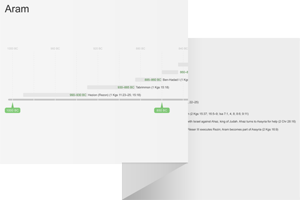16:1–14 Both 1 Kings and 2 Chronicles describe Asa’s conflict with Baasha and his covenant with Ben-hadad (1 Kgs 15:16–22; 2 Chr 16:1–6). However, 2 Chronicles includes a rebuke from Hanani that is not mentioned in 1 Kings (16:7–10). By including this material, the Chronicler warns his audience of returned exiles to rely on God rather than neighboring nations. |
16:1 Baasha the king of Israel The Chronicler gives very few details about the northern kings. Baasha ruled circa 900–886 bc, having become king after killing Nadab, Jeroboam’s successor (see 1 Kgs 15:25–16:7).
Ramah A city about five miles north of Jerusalem in the tribal territory of Benjamin. A military presence in Ramah would pose an imminent threat against Judah.
16:2 from the storehouses of The same spoils of war that he had dedicated to God (see 2 Chron 15:18).
Aram Kingdom located north of Israel (the northern kingdom)—and thus a strategic ally for Judah (the southern kingdom). Although the Hebrew text refers to this nation as “Aram,” it is sometimes called by its later name, “Syria.”
King of Aram/Syria | Date | King of Judah | Date |
Tabrimmon | 930–885 bc | Rehoboam | 930–913 bc |
Ben-Hadad I | 885–860 bc | Abijah | 913–910 bc |
Ben-Hadad II (Hadadezer) | 860–843 bc | Asa | 910–873 bc |
16:3 a covenant This treaty is not mentioned elsewhere. It might be the reason Jeroboam did not become powerful during Abijah’s reign (13:20).
16:4 against the cities of Israel The cities named here are in the Upper Galilee region.
16:6 Geba and Mizpah Strategic cities north of Jerusalem. See 1 Kgs 15:22 and note.
16:7 Hanani the seer Mentioned only here in the Bible. Hanani’s son, Jehu, prophesied to Baasha (1 Kgs 16:1) as well as Asa’s son, Jehoshaphat (2 Chron 19:2).
16:8 a mighty army with very abundant See 14:9 and note.
because of your reliance on Yahweh See note on 14:11.
16:9 from now on you will have wars Earlier, Asa was given peace when he sought God (14:6–7; 15:19). Now that he has stopped relying on God and has started relying on foreign alliances, he will face conflict.
16:10 was angry with the seer Asa’s reaction is in line with later kings who oppressed prophets who brought unfavorable messages (18:12–27; 24:20–21).
16:11 the words of Asa from the first to the last A common epitaph for deceased kings (1 Kgs 11:41; 14:19).
the scroll of the kings of Judah and Israel The Chronicler refers to this source several times (e.g., 2 Chr 27:7; 35:27). The exact nature of the source is unknown, but it most likely is not the same work as the biblical 1–2 Kings. Second Chronicles refers to this source in contexts for which 1–2 Kings gives no further information. Compare 27:1–9; 2 Kgs 15:32–38.
16:12 he fell severely ill in his feet See 1 Kgs 15:23 and note.
he did not seek Yahweh The Chronicler notes that Asa ended his reign by not seeking God even when diseased. Rather than relying on God, he relied on physicians. See 2 Chron 14:4 and note; 14:11 and note.
16:13 slept with his ancestors See note on 9:31.
16:14 all kinds of spices made by the perfumers as a fragment ointment A sign of honor (compare Jer 34:5). Even though Asa’s story ends with several failings, the honor he received in death corresponds with the positive assessment of him in 2 Chron 14:2.

|
About Faithlife Study BibleFaithlife Study Bible (FSB) is your guide to the ancient world of the Old and New Testaments, with study notes and articles that draw from a wide range of academic research. FSB helps you learn how to think about interpretation methods and issues so that you can gain a deeper understanding of the text. |
| Copyright |
Copyright 2012 Logos Bible Software. |
| Support Info | fsb |
 Loading…
Loading…
 entire family (
entire family (
